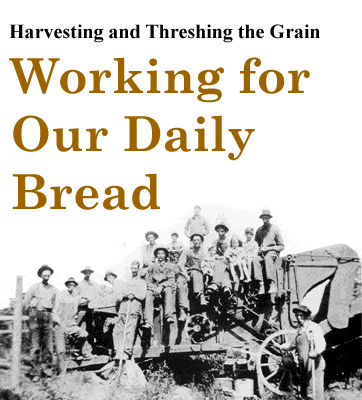
 |
By Gene BaileyThis Mercer County threshing crew and machine, pictured about 1919, were similar to those author Gene Bailey recalls from his early years on his grandparents' farm. |
"If we don't work we can't eat," was Granddaddy's philosophy on the farm. My early childhood was spent on a mountain farm in southern West Virginia. It was a perfect classroom to show us the relationship between the work that we did and the bread that we ate at meal time. We produced the grain, had it ground, and made the bread on the farm.
And on a crisp November morning those freshly made biscuits, with real butter melted on them, covered with sorghum molasses or cinnamon-flavored apple butter, did taste good.
I was born in 1933, in the Pisgah community (pronounced "Pisgee") not far from Princeton, Mercer County. My brother Ronald and I lived on the farm with our parents, Forest and Ruth Bailey; grandparents, Gilbert "Bishop" Bailey and Stella Bailey; and my unmarried aunt, Virginia "Ginny" Bailey - three generations in one house. And all of us, from the youngest to the oldest, had to help with the work. The work was essential if we were to eat because most of our food was produced and preserved on the farm.
You can read the rest of this article in the Fall 1997 issue of Goldenseal, available in bookstores, libraries or direct from Goldenseal.